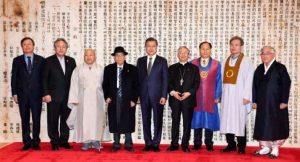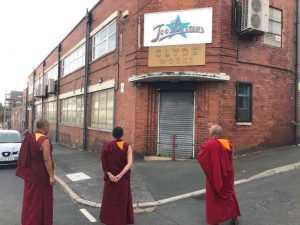
Approximately 150 Christian and Buddhist representatives from 12 Asian nations, the United Kingdom, and the Holy See assembled in Bangkok from 13–16 November for the seventh Buddhist-Christian Colloquium. The event, themed “Karuna and Agape in Dialogue for Healing a Wounded Humanity and the Earth,” was a platform to foster dialogue and cooperation between the two religious communities.
In a joint statement released on 16 November, the participants emphasized the importance of collaboration to instill hope and compassion in a world facing adversity. They underscored the need for shared action rooted in their religious teachings, issuing seven core points to implement across their respective regions.
“Even though our respective religious teachings invite us to build a culture of compassion, we often turn a blind eye to today’s sufferings. We deplore the words and actions that have voluntarily or involuntarily contributed to sow death and destruction, hatred, and revenge. We need to acknowledge that we belong to one human family and owe everyone equal dignity and respect,” the scholars said in their final statement after the colloquium. (La Croix International)
“In these troubled times, we refuse to give in to despair, for we strongly believe that in the midst of dark clouds, those who are deeply rooted in their respective religious traditions and willing to work together with everyone can bring a ray of hope to a desperate humanity,” the representatives said in the final declaration. (Catholic Review)
The colloquium, organized by the Vatican’s Dicastery for Interreligious Dialogue in conjunction with the Catholic Bishops’ Conference of Thailand and the Mahachulalongkornrajavidyalaya Buddhist University, aimed to explore the interconnectedness between compassion and love—termed “Karuna and Agape” in Buddhist and Christian contexts, respectively.
“No one is saved alone; we can only be saved together for we are interconnected and interdependent. Thus, we need to cooperate with everyone: civil society, followers of other religions, media personnel, governments, international bodies, academic and scientific communities, and all other interested parties in order to foster an inclusive world,” the scholars said. (La Croix International)
Cardinal Miguel Ángel Ayuso Guixot, prefect of the Dicastery for Interreligious Dialogue, noted the necessity of collaboration in such dialogues.
The final statement endorsed by the assembly advocated for continued prayer, education, dialogue, cooperation, and a commitment to acknowledging suffering and fostering empathy. It also called for innovative approaches to interpret religious texts and historical wisdom relevantly in the contemporary world.
The participants emphasized the need for a culture of compassion, acknowledging the interdependence of humanity and the imperative to cooperate inclusively for the planet’s well-being. Bishop Olivier Schmitthaeusler, Vicar Apostolic of Phnom Penh in Cambodia, emphasized the importance of global solidarity, envisioning a world free from social disparities and built on values of harmony and mutual respect.
“The dialogue promises to be an opportunity for collaboration and a shared vision for the well-being of our communities,” Schmitthaeusler said. “The Lord created the world and created people. God saw that it was good, it says in Genesis. Nature and people are entrusted to our responsibility. Let us dream together of a world in which there is neither rich nor poor, in which no one is excluded or despised.” (La Croix International)
The seven actions agreed to at the colloquium included prayer, education, dialogue, cooperation, acknowledging suffering, cultivating empathy, and promoting innovation.
“There will be no peace without dialogue. Dialogue can prevent violence,” by offering healing and inspiration, the final statement said. “It can mobilize different religious groups to seek justice and truth, to protect the planet, and to protest against its destruction. We need to cultivate empathy for the suffering of others and the environment. Thus, we need compassion in political and economic decisions.” (Catholic Review)
In concurrence with the colloquium, Venerable Phra Brahmapundit, a member of Thailand’s Supreme Sangha Council, highlighted karuna or compassion as vital in healing both humanity and the Earth from wounds inflicted by climate crises, poverty, and conflicts. This sentiment was echoed by Pope Francis during his interactions with Buddhists in 2022, emphasizing the commonality between Buddhist teachings and Christian principles regarding compassion and selflessness.
The dialogues emphasized the pivotal role of empathy in decision-making and urged the integration of compassion in political and economic realms to promote inclusivity and justice. Ultimately, the event highlighted the urgent need for inter-religious collaboration, emphasizing compassion as the common ground for addressing the multifaceted challenges faced by humanity and the planet.
See more
Buddhist-Christian dialogue calls for shared action to spread hope (Catholic Review)
Buddhist, Catholic scholars in Bangkok agree to use “compassion” to heal world (La Croix International)
Seventh Buddhist-Christian Colloquium kicks off in Bangkok (Vatican News)
Related news reports from BDG
Pope Francis Quotes the Buddha and Praises Interfaith Dialogue in Mongolia Visit
Buddhist Leaders to Take Part in Interfaith Dialogue with Pope Francis in His First Trip to Mongolia
Interfaith Dialogue: Parliament of the World’s Religions Convenes in Chicago with a Focus on Human Rights
Young Buddhist Association of Indonesia Holds Interfaith Dialogue on Religious Moderation
Buddhists from Thailand Visit Vatican for Interfaith Dialogue
Young Buddhist Association of Indonesia and Rumi Institute Organize an Interfaith Dialogue on “Religion of Love”
Young Buddhist Association of Indonesia Holds Interfaith Dialogue on Women and Spirituality














